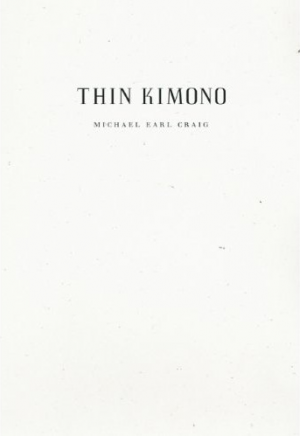Thin Kimono

Michael Earl Craig wants you to know something: he's glad he's not a poet. He is a Certified Journeyman Farrier who says, “Every now and then I wonder if I fucked up with this horseshoeing thing, but then I talk with my friends in academia and, well, I’m okay with my choices.” So yes, he does write poetry, and may even author a volume or two, but he’s not a poet.
Thin Kimono is one of those volumes. Some of the pieces within read like slightly cracked, modern versions of William Carlos Williams’ prescription pad musings. Others read like skewerings of the absurdity of twenty-first century living, where plane rides and acupuncturist visits reveal that “people fall into two categories: Doonesbury or Far Side./ Well, or Andy Capp. Andy Capp type people./ They’re everywhere.” All are written in plain language that cobbles together a patchwork of ideas, concepts and images culled by Craig from ordinary encounters and events. While he contends that his readers can be dumb and still understand his poetry, Craig creates a complex, absurd world by isolating and examining the smallest details of daily life around him, presenting them together like a coveted, surreal menagerie.
But wait: Craig also wants you to know that he is not a surrealist. In “Poem,” he admonishes: “To those people who are always talking about ‘surrealism’/ can I suggest you open your fucking eyes?/ If you do this, you will see mothballs./ And a green nightgown.” However, I would argue that surrealism is nothing more than an intensely peculiar and personal interpretation of reality. Craig walks like an alien among us, with new eyes for the world and his craft, remote from the process and conventions that typify modern poetics. Sometimes this results in pieces that read like inside jokes – his more unsuccessful poems feel a little “you-had-to-be-there.”
The majority of the poems tantalize with their ability to look deeply into the archetypes and absurdity of this, our modern way of life. Craig himself winks at us in these successes: his “Advice for the Poet” is typical of his verse, tersely recommending: “Never aim your bicycle at a chicken./ Never set your glasses on an anvil.” However, his real advice seems to come from an Albert Einstein quote he uses twice in the volume: “‘Something deeply hidden had to be behind things.’“ In Craig’s poetry, something is hidden; meaning lurks in the periphery and skitters away when you look at it directly. He doesn’t truss up a take-home message for his readers but the hunt itself is invigorating. For someone who isn’t a poet, he sure does a mean imitation of one.